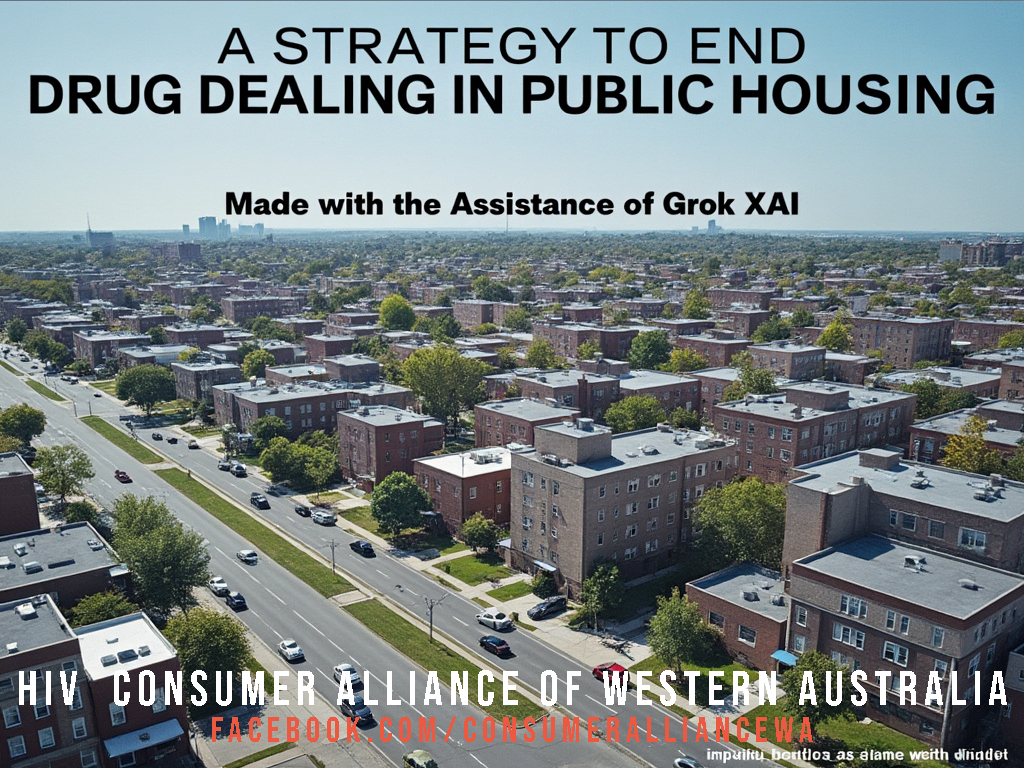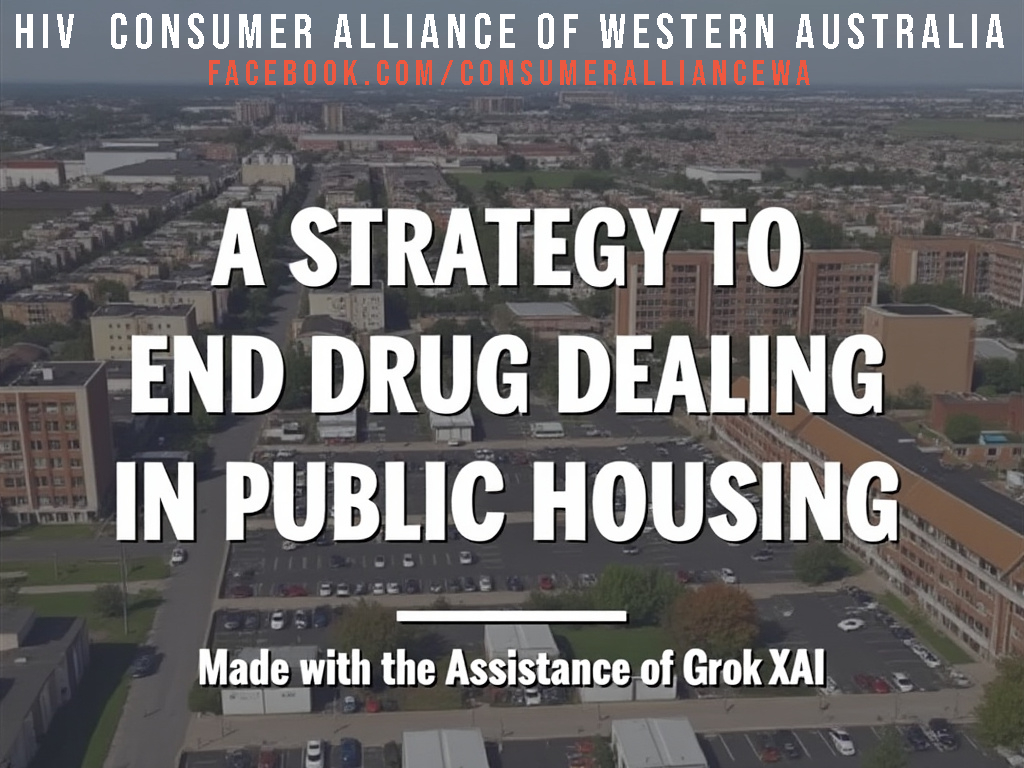Make Housing Safe Again: End Drug Dealing in Public Housing!
All across Australia concerns are being raised about the out of control #meth epidemic and the crime wave that results from black market drug dealing. There is a perception in the community that policy makers in government and the NGOs who deliver tax payer funded services are privileging the chaotic lifestyles of drug users over the duty of care to provide tenants with safe housing & the rights of the community live in safety.
The growing housing crisis also enables the idea of some that tenants in public or social housing are lucky to have a house and thus should put up with unsafe living conditions. Comments made to members of the HIV Consumer Alliance of WA suggest that there is an attitude that people on low incomes need to accept that they must live surrounded by the crime and violence caused by this out of control meth usage.
The inclusion of criminal background checks into the Housing selection process needs to happen as a matter of urgency to ensure that people with known violent tendencies and meth dealing histories are not placed in houses next to vulnerable populations including the elderly, disabled & recovering victims of domestic violence.
The criminal justice system and Indigenous Service need to provide housing to enable inmates to transition safely into the community with supports to prevent re-offending. There needs to be more housing provided "on country" for Indigenous people to enable meth addicts to rehabilitate and reconnect with their communities.
More needs to be done to enable people in social housing, especially those with disabilities, to access part time employment without the penalty of high rental increases. Drug Dealing should be treated as a business and the rents of drug dealers should be increased to commercial rates to take account of the large profits that are being made by drug dealing in public or social housing.
Dumping people in the community and turning a blind eye to the crime and violence that results is not a good public health solution. Everyone has the right to be Safe in their Housing free from harassment including low income people.The aim of this policy is to provide members of the community with the language structures with which to engage with the debate as we head towards the WA State Election which will be held on the 8th March 2025.
If you are concerned about this Meth Epidemic and the domestic violence and crime that this is directly causing then Now is the time to act. We suggest you contact your local Member of Parliament and tell them you want action!
If you are on X.com then the Minister for Housing for WA is @JohnCareyPerth and we know his office loves to hear from Members of the Community! Make sure you tag the Liberal Opposition and the Premier of WA, Roger Cook, so they are aware that members of the community want real action to Make Housing Safe Again.
Next Page: A Strategy to End Drug Dealing in Public Housing.
A Strategy to End Drug Dealing in Public Housing.
To effectively prevent drug dealing in social housing, a multi-faceted approach involving community, legal, and social interventions is necessary. Here's how it could be addressed:
**1. Community Engagement:**
- **Tenant Engagement:** Encourage residents to form neighborhood watch groups or tenant associations that monitor and report suspicious activities. This community policing approach leverages local knowledge and increases vigilance.
- **Education Programs:** Implement education programs that inform residents about the signs of drug dealing, how to report it safely, and the community benefits of a drug-free environment.
**2. Policy and Legal Framework:**
- **Strong Lease Agreements:** Include explicit clauses in lease agreements prohibiting drug-related activities. This gives legal ground for eviction if such activities are proven.
- **Eviction for Breach:** Swift legal action should be taken against individuals involved in drug dealing according to the lease terms. This requires efficient legal processes to enforce evictions where drug activities are confirmed.
- **Zero Tolerance Policies:** Adopt policies similar to the "one strike and you're out" approach, which might involve immediate eviction for drug-related crimes, but balanced with due process to prevent abuse of power.
**3. Physical Security Measures:**
- **Surveillance and Lighting:** Improve lighting and consider installing CCTV cameras in common areas to deter criminal activities and increase the likelihood of detection.
- **Access Control:** Implement secure entry systems for buildings to limit who can enter, making it harder for non-residents to conduct drug deals within the premises.
**4. Collaboration with Law Enforcement:**
- **Police Partnerships:** Work closely with local law enforcement to monitor known drug hotspots and respond quickly to reports of drug dealing. Regular police patrols can act as a deterrent.
- **Information Sharing:** Establish protocols for sharing information between housing management, residents, and police to enable timely interventions.
**5. Support Services:**
- **Recovery and Support Programs:** Provide or facilitate access to drug rehabilitation and support services for residents. This can help those struggling with addiction and potentially reduce the supply and demand for drugs within the housing.
- **Employment and Education:** Offer pathways to employment or education which can reduce economic incentives for drug dealing by providing legitimate income sources.
**6. Housing Management:**
- **Tenant Screening:** While being careful not to violate fair housing laws, conduct thorough background checks to screen out individuals with recent histories of drug-related crimes or dealing.
- **Property Maintenance:** Keep the property in good condition. A well-maintained environment can foster a sense of community pride and deter criminal activities.
**7. Addressing Vulnerability:**
- **Protecting Vulnerable Tenants:** Implement measures to protect vulnerable tenants from being exploited through practices like "cuckooing," where drug dealers take over a home to use as a base.
**8. Legal Tools:**
- **Injunctions and ASB Orders:** Use legal tools like anti-social behavior injunctions that can restrict specific individuals from engaging in drug-related activities.
**9. Community Facilities:**
- **Provide Alternatives:** Develop community spaces where residents can engage in positive activities, reducing the time and opportunity for engaging in or encountering drug dealing.
The key to success in such initiatives is ensuring that there's a balance between enforcement and support, recognising that punitive measures alone might not address the root causes of drug dealing. Community involvement, coupled with legal enforcement, and support for rehabilitation can create a holistic approach to reducing drug dealing in social housing.
This is a Strategy made by the HIV Consumer Alliance of WA with the Assistance of Grok Ai!
Editor's Note:
Clearly this outcome demonstrates how effective health policies can be made without the influence of ideological frameworks pushed by political operatives in policy making.
Grok Ai suggests a future in which many jobs will able to be taken over by much more effective Ai with the assistance of Human Managers! This will certainly benefit tax payers who are burdened by the costs of the current cumbersome bureaucracy that stifles public policy development and provides spaces in which extremist political ideologies thrive.
To access Grok Ai you have to be a Premium Subscriber of X.com.




















